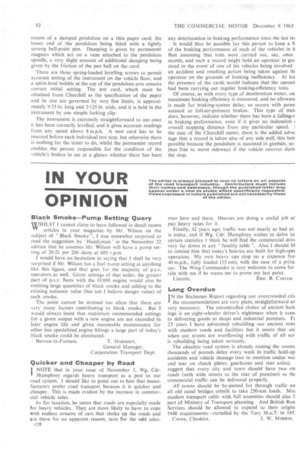IN YOUR OPINION
Page 84

If you've noticed an error in this article please click here to report it so we can fix it.
Black Smoke-.-Pump Setting Query jvHILST I cannot claim to have followed in detail recent " articles in your magazine by Mr. Wilson on the subject of " Black Smoke ", I was somewhat surprised to read the suggestion by Handyman ' in the November 22 edition that he assumes Mr. Wilson will have a pump setting of 20-21 per 200 shots at 600 r.p.m.
I would have no hesitation in saying that I shall be very surprised if Mr. Wilson has a fuel Dump setting at anything like this figure, and that goes for the majority of p.s.v. operators as well. Given settings of that order, the greater part of p.s.v. fleets with the 01600 engine would also be emitting large quantities of black smoke and adding to the existing nuisance value (but not I believe danger value) of such smoke.
The point cannot be stressed too often that there are very many factors contributing to black smoke. But I would always insist that maximum recommended settings for a given output with a new engine are not exceeded in later engine life and given reasonable maintenance for other less specialized engine fittings a large part of today's black smoke could be eliminated.
Barrow-in-Furness. T. MARSDEN,
General Manager, Corporation Transport Dept.
Quicker and Cheaper by Road I NOTE that in your issue of November 1, Wg. Cdr. I Humphrey regards heavy transport as a pest to our road system. I should like to point out to him that manufacturers prefer road transport because it is quicker and cheaper. This is made evident by the increase in commercial vehicle sales.
As for taxation, he states that roads are especially made for heavy vehicles. They are more likely to have to cope with endless streams of cars that choke up the roads and are there for no apparent reason, save for the oid sales c28 man here and there. Heavies are doing a useful job at pay heavy taxes for it.
Finally, 42 years ago, traffic was not nearly as bad as is today, and if Wg. Cdr. Humphrey wishes to delve in certain statistics I think he will find the commercial drivl very far down in any "fatality table ". Also I should NI to remind him that today's heavies are built for high-spec operation. My own heavy can stop on a sixpence froi 40 m.p.h., fully loaded (15 ton), with the ease of a priva car. The Wing Commander is very welcome to come for ride with me if he wants me to prove my last point.
Lincoln. ERIC B. CARTER.
Long Overdue IN the Buchanan Report regarding our overcrowded citil I the recommendations are very plain, straightforward an very necessary. The uncontrolled clutter of ancient buffi ings is an eight-wheeler driver's nightmare when it corn to delivering goods to shops and industrial premises. F( 25 years I have advocated rebuilding our, ancient towt with modern roads and facilities but it seems that on when our streets are overflowing with traffic of all sor is rebuilding being taken seriously.
The obsolete road system is already costing the count' thousands of pounds delay every week in traffic hold-up accidents and vehicle damage (not to mention undue wmand tear on clutch plates, gearboxes and rear axles). suggest that every city and town should have two rin roads (with wide streets to the rear of premises) so tlu commercial traffic can be delivered properly.
All towns should be by-passed for through traffic an all old canal bridges rebuilt to take 250-ton loads. Moi modern transport cafes with full amenities should also t part of Ministry of Transport planning. And British Roa Services should be allowed to expand to their origin; 1948 requirements—curtailed by the Tory M.o.T. in 195.
Crewe, Cheshire. J. W. Moms.




























































































































